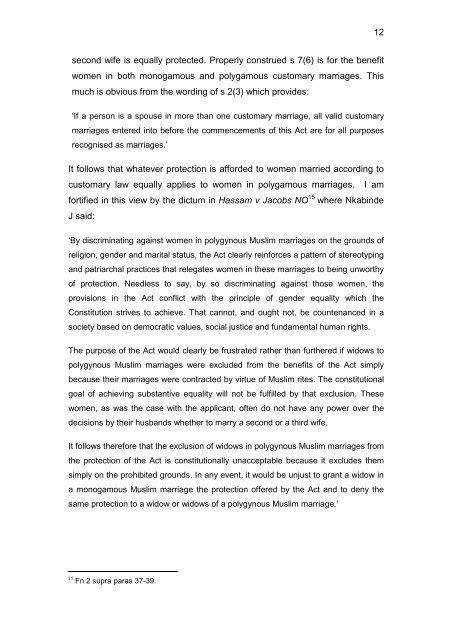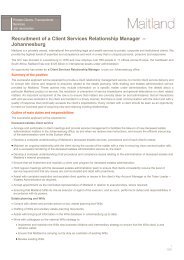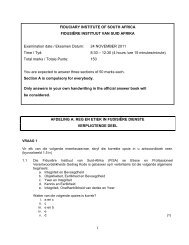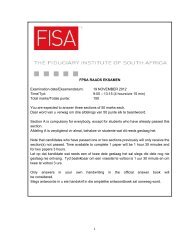Ngwenyama v Mayelane wedding after customary wedding
Ngwenyama v Mayelane wedding after customary wedding
Ngwenyama v Mayelane wedding after customary wedding
Create successful ePaper yourself
Turn your PDF publications into a flip-book with our unique Google optimized e-Paper software.
12<br />
second wife is equally protected. Properly construe d s 7(6) is for the benefit<br />
women in both monogamous and polygamous <strong>customary</strong> m arriages. This<br />
much is obvious from the wording of s 2(3) which pr ovides:<br />
‘If a person is a spouse in more than one <strong>customary</strong> marriage, all valid <strong>customary</strong><br />
marriages entered into before the commencements of this Act are for all purposes<br />
recognised as marriages.’<br />
It follows that whatever protection is afforded to women married according to<br />
<strong>customary</strong> law equally applies to women in polygamou s marriages. I am<br />
fortified in this view by the dictum in Hassam v Jacobs NO 15 where Nkabinde<br />
J said:<br />
‘By discriminating against women in polygynous Musl im marriages on the grounds of<br />
religion, gender and marital status, the Act clearl y reinforces a pattern of stereotyping<br />
and patriarchal practices that relegates women in t hese marriages to being unworthy<br />
of protection. Needless to say, by so discriminatin g against those women, the<br />
provisions in the Act conflict with the principle o f gender equality which the<br />
Constitution strives to achieve. That cannot, and o ught not, be countenanced in a<br />
society based on democratic values, social justice and fundamental human rights.<br />
The purpose of the Act would clearly be frustrated rather than furthered if widows to<br />
polygynous Muslim marriages were excluded from the benefits of the Act simply<br />
because their marriages were contracted by virtue o f Muslim rites. The constitutional<br />
goal of achieving substantive equality will not be fulfilled by that exclusion. These<br />
women, as was the case with the applicant, often do not have any power over the<br />
decisions by their husbands whether to marry a seco nd or a third wife.<br />
It follows therefore that the exclusion of widows i n polygynous Muslim marriages from<br />
the protection of the Act is constitutionally unacc eptable because it excludes them<br />
simply on the prohibited grounds. In any event, it would be unjust to grant a widow in<br />
a monogamous Muslim marriage the protection offered by the Act and to deny the<br />
same protection to a widow or widows of a polygynou s Muslim marriage.’<br />
15 Fn 2 supra paras 37-39.



![Motsepe v Khoza customary marriage and child[3]](https://img.yumpu.com/44777240/1/184x260/motsepe-v-khoza-customary-marriage-and-child3.jpg?quality=85)


